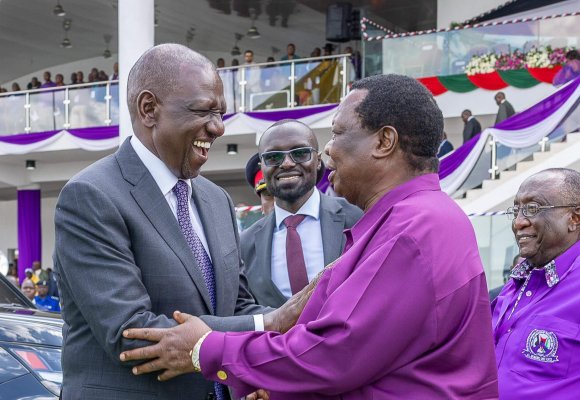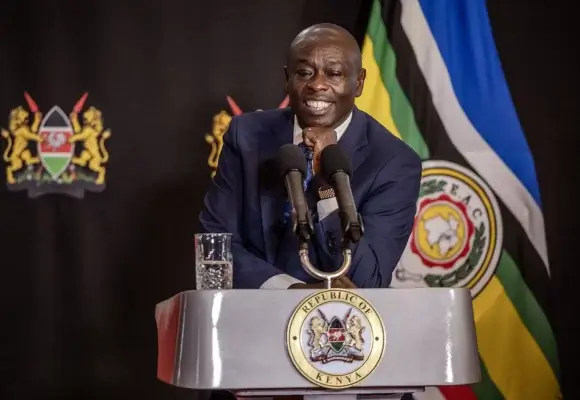|
LISTEN TO THIS THE AFRICANA VOICE ARTICLE NOW
Getting your Trinity Audio player ready...
|
Kenya Bans Non-essential Trips For Govt Officials
The Kenyan government has banned public officials from taking non-essential trips abroad as part of efforts to cut spending. This includes travel for benchmarking, study, training, and research, according to a statement released Monday by the Head of Public Service, Felix Koskei.
Conferences are also among the events categorized as non-essential. Koskei directed government officials to participate in such events virtually or ask diplomatic officials in host countries to attend.
The move comes after local media reported that officials spent 14 billion Kenyan shillings on travel within the first nine months of President Ruto taking office.
“Foreign travel will only be facilitated for engagements in which the government of Kenya’s participation is part of the fulfillment of state obligations,” Koskei said, and in events involving “critical decisions impacting on the country’s position.”
He also capped the delegations of ministers and governors to three persons and said that they would only be allowed out of the country for a maximum of seven days per trip and 45 days per year.
Koskei added that the delegations of the president, vice-president, and first lady would only comprise staff with a direct role in scheduled activities.
Ruto Orders 10% Budget Cut for Government Agencies
The Kenyan government has slashed its expenditures by 10 percent in the current financial year as part of austerity measures to ensure the state agencies adjust to the global economic crisis.
President William Ruto issued the directives during a cabinet meeting, stating that there is a need for the government to exercise prudence in resource utilization, and that wastage and corruption would not be tolerated.
The move is aimed at bringing back sanity in spending in public service and unshackle the country from the burden of public debt.
The Head of State also issued a warning to government officials seeking to bypass the use of a unified payment system, underscoring the necessity for better oversight.
President Ruto’s austerity measures come at a time when pressure has been mounting on the Kenyan government to reduce the high cost of living triggered by rising food and fuel prices.
This is largely because increasing taxes would overburden taxpayers whose disposable incomes have been hit by the high cost of living, while on the other hand expenditure cuts could choke further growth in output.
The Kenya Kwanza Alliance government is pursuing a fiscal consolidation process, including putting a lid to fresh borrowing as part of measures to kickstart the recovery of an economy reeling from rising inflation, shortage of the US dollar, and shrinking forex reserves.
Amnesty International Warns UN Against Deploying Kenyan Security Forces to Haiti
Amnesty International has urged the United Nations Security Council to carefully consider the human rights record of Kenyan security forces before voting on a resolution to deploy them to Haiti.
The Security Council is expected to vote today (Monday) on a resolution that would authorize the deployment of an “international specialized force” led by Kenyan law enforcement officers to Haiti to help the Haitian National Police address insecurity caused by gang violence.
In a letter to the Security Council, Amnesty International Representative at the United Nations Renzo Pomi expressed concerns about the Kenyan police’s recent use of excessive and unnecessary force, including lethal force, against protesters, which has led to numerous deaths and injuries, including of children.
Pomi urged the Security Council to take these concerns into account when considering the resolution, stating that “protection of human rights should always be at the forefront of any decision-making process.”
Amnesty International also noted that it has documented at least 30 cases of police killings of protesters in Kenya, including during anti-government protests. The organization has also documented serious human rights violations, including beatings, arbitrary arrests, detention of protesters, and the indiscriminate and disproportionate use of tear gas and water cannons.
In addition, Amnesty International warned that the Kenyan police have a history of extrajudicial killings and enforced disappearances. The organization and 14 partner organizations in Kenya have documented a total of 371 people in 2021 and 2022 who were reported to have been killed or disappeared in police custody.
Amnesty International’s concerns are shared by many human rights activists and Haitian citizens. Some Haitians have expressed concerns that the deployment of Kenyan security forces could lead to more human rights abuses.
Ruto Welcomes UN Approval of Police Mission In Haiti
President William Ruto Tuesday hailed the UN Security Council’s vote to approve a Kenya-led police mission to Haiti. He vowed that Kenya would not fail the Haitian people, calling the mission “of special significance and critical urgency.”
The UN resolution authorizes the mission to support Haitian police in combating gangs that have taken control of large parts of the country, waging terror on residents and killing hundreds.
Ruto said the situation in Haiti is a matter of “humanitarian consideration” and requires collective action. He quoted Kenya’s first president, Jomo Kenyatta, saying: “In our struggle, we always had friends, not an overwhelming multitude of powerful allies, yet nevertheless true, loyal and determined friends. The people of Haiti, our dear friends, today stand in need. It is our fundamental moral obligation to be their friend indeed, by standing with them.”
However, some critics have opposed the mission or expressed skepticism about the ability of Kenyan police to take on Haiti’s gangs. Former Kenyan chief justice Willy Mutunga told the BBC that the deployment of Kenyan officers to Haiti without consulting the Kenyan people is “unconstitutional.” Rights group Amnesty International has called for a “thorough” examination of “the mission’s human rights and humanitarian implications before deployment.”
Despite these concerns, Ruto is determined to see the mission through. He has said that Kenya has a long history of peacekeeping and that its police are well-trained and equipped to handle the challenges in Haiti. He has also pledged to work closely with the Haitian government and other stakeholders to ensure the success of the mission.


































































LEAVE A COMMENT
You must be logged in to post a comment.